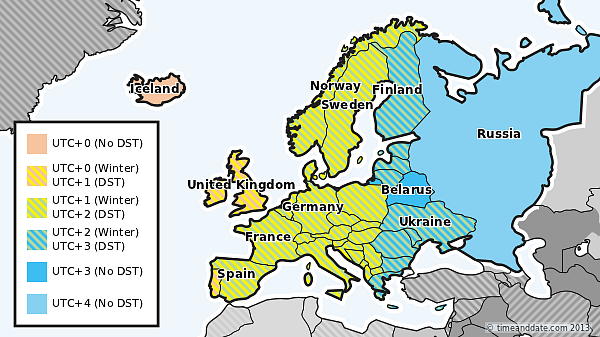Clocks Go Back One Hour in Europe Sunday, Oct 25, 2015
Sunday, October 25, 2015 at 1:00 UTC, clocks will be set back one hour when Daylight Saving Time (DST) ends in most of Europe.

Summer time ends in most of Europe.
Local time for DST end in Europe
Lighter Mornings – Darker Nights
Sunrise and sunset will be about one hour earlier on Sunday, October 25, 2015, than the day before, so there will be more light in the morning.
USA & Canada end DST Nov 1, 2015
Same Time All Over Europe
European countries synchronize their DST, which starts on the last Sunday of March and ends on the last Sunday of October. It includes:
- the European Union (EU) – including the United Kingdom, France, Germany, Spain, Italy and Bulgaria.
- most other European countries – including Norway and Switzerland.
European Countries With No DST
A few European countries don't use DST at all: Belarus, Iceland, Georgia, Armenia, and Russia.
Turkey DST Extended
Due to general elections, the authorities have reported that Turkey delays the end of DST 2015 by two weeks.
Normally, Turkey is in sync with the rest of Europe. However, this year, clocks there will be turned back one hour from 4:00 (4 am) to 3:00 (3 am) local time on Sunday, November 8, 2015, to keep the evenings light while people cast their votes.
Most of Mexico Also Ends DST on Oct 25
In most parts of Mexico, DST also ends on Sunday, October 25. Clocks are set back 1 hour from 2:00 (2 am) to 1:00 (1 am) local time.
However, the northern Mexican border towns, like Tijuana and Juarez City (Ciudad Juárez), follow the USA's DST schedule, and set their clocks back one week later, on Sunday, November 1, 2015, at 2:00 (2 am) local time.
A few Mexican cities, like Hermosillo, don't use DST at all.
One Hour Back or Ahead?
To remember which way to set your watch, keep in mind one of these sayings:“Spring forward, fall back” or “Spring ahead, fall behind.” The clock moves ahead (= losing one hour) in the spring when DST starts, and falls back one hour (= gaining one hour) when DST ends in the fall.
Local Times in Europe for DST End
| Time Zone during DST | Local time of DST end | Time Zone after DST - Standard time |
|---|---|---|
British Summer Time (BST) used in UK and Ireland during summer UTC offset: +1 hour | DST ends at 2:00 (2 am) local time. | UTC offset: None |
Western European Summer Time (WEST) observed in Portugal, Faroe Islands and the Canary Islands. UTC offset: +1 hour | DST ends at 2:00 (2 am) local time. Clocks are set back one 1 hour to 1:00 (1 am). | UTC offset: None |
Central European Summer Time (CEST), used in countries including France, Germany, Austria, Italy, Switzerland, Norway, Poland, Hungary, and Spain. UTC offset: +2 hours | DST ends at 3:00 (3 am) local time, when clocks are set back 1 hour to 2:00 (2 am). | UTC offset: +1 hour |
Eastern European Summer Time (EEST), observed in countries including Bulgaria, Estonia, Finland, Greece, Latvia, Romania, and most areas in Ukraine. UTC offset: +3 hours | DST ends at 4:00 (4 am) local time, when clocks are set back 1 hour to 3:00 (3 am). | UTC offset: +2 hours |
Most of the western parts of Russia and some parts of Ukraine are in the Moscow time zone, Moscow Standard Time (MSK). UTC offset: UTC +4 hours | UTC offset: UTC +3 hours |